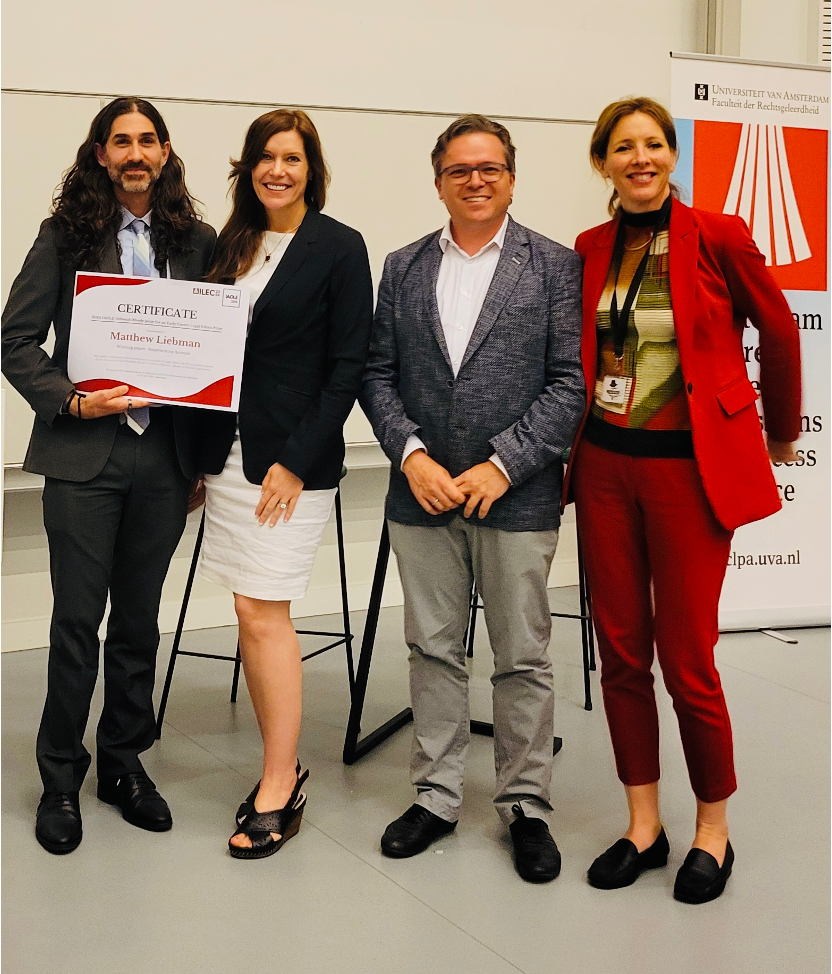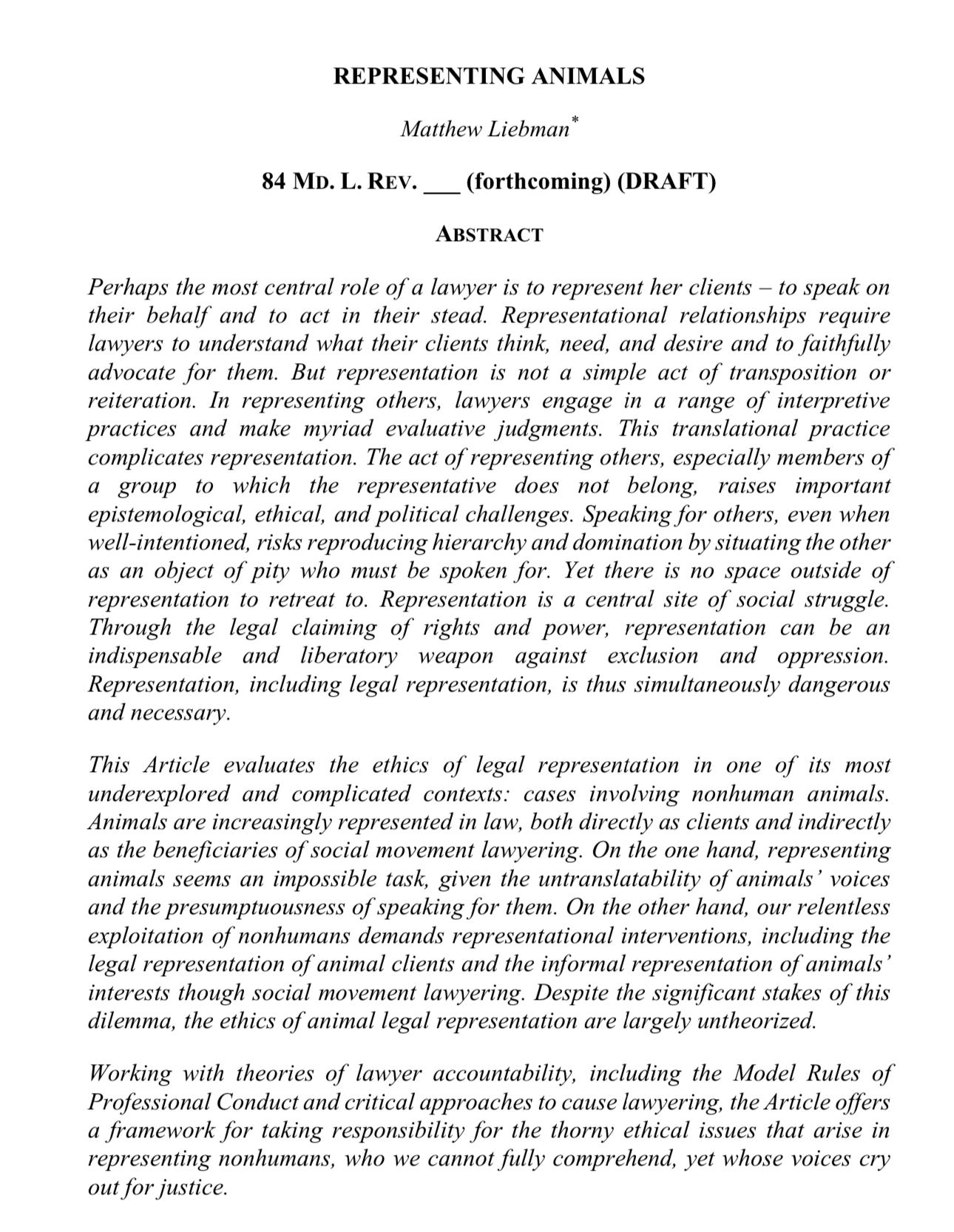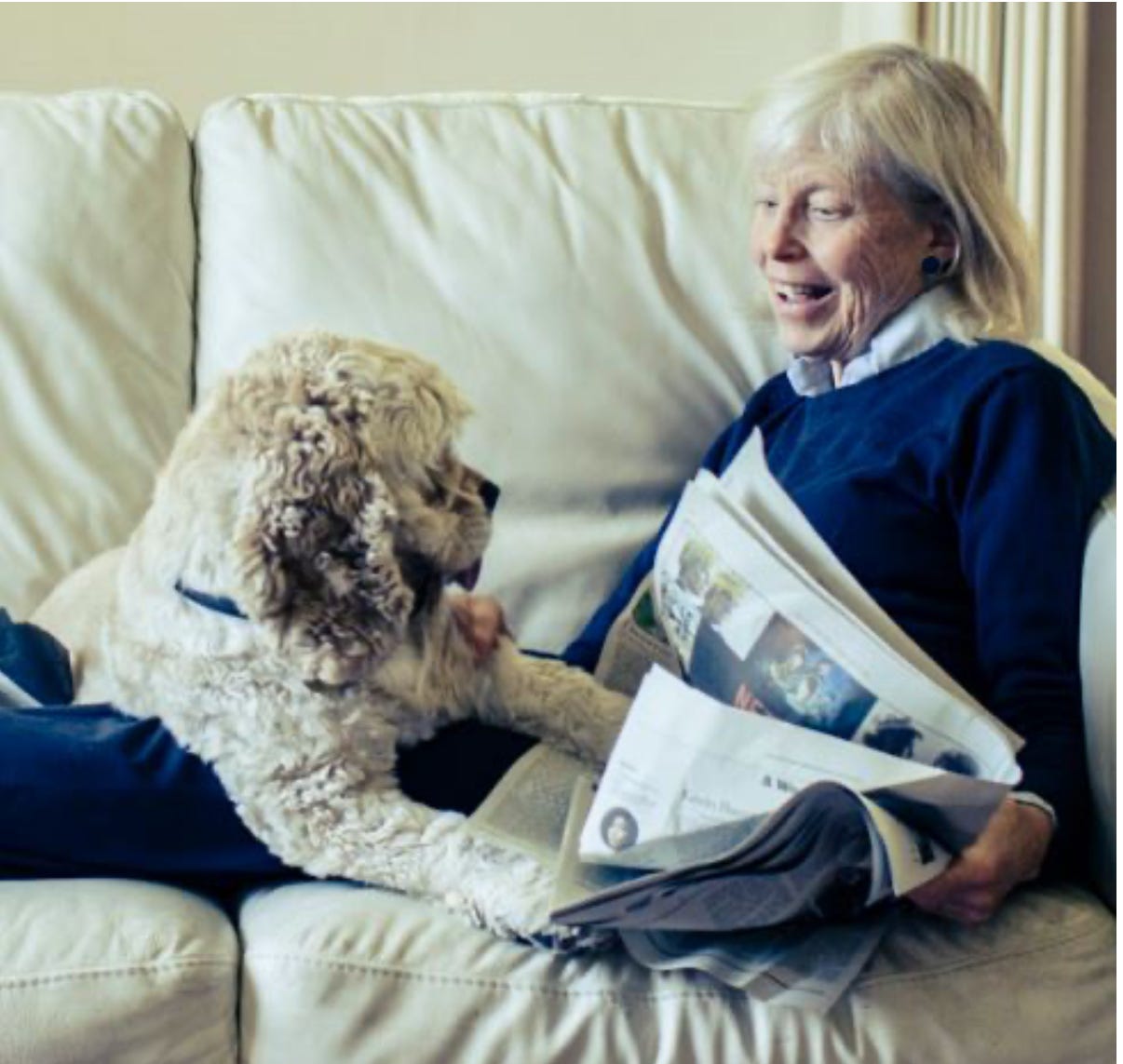LER No. 52 - Professor Liebman Wins Rhode Prize for "Representing Animals" (07.22.24)
The Legal Ethics Roundup - your Monday morning tour of all things related to lawyer and judicial ethics with University of Houston law professor Renee Knake Jefferson
Welcome
Thank you for being here. Welcome to what captivates, haunts, inspires, and surprises me every week in the world of legal ethics.
Each week the Legal Ethics Roundup is viewed by more than 1,500 readers across the United States and in 38 different countries. Subscribers include judges, lawyers, professors, state bar administrators, students, government officials, and people who care about the future of our democracy.
If you haven’t subscribed, take a moment now to sign up at the link below. It’s free! And you’ll never miss the latest edition. Please also consider becoming a paid subscriber, which helps to support this weekly newsletter and unlocks special bonus content, along with the ability to post comments.
This week we’re mixing things up at the Roundup to honor the winner of the Deborah Rhode Prize for Early Career Scholars awarded by International Association of Legal Ethics. The prize is given biennially in connection with the International Legal Ethics Conference (ILEC), and includes an all-expenses paid trip to present at the conference which this year was held at the University of Amsterdam.
The prize was established in honor of the Association’s first President, the late Professor Deborah L. Rhode of Stanford Law School. To learn more about her life, see here. For more details about the prize, see here.
I had the privilege of presenting the award to Professor Matthew Liebman (University of San Francisco) at the conference last week for his article “Representing Animals.” I want to also recognize Professor Jonah Perlin (Georgetown) who was selected as runner-up for his article “Client Confidentiality as Data Security,” which innovatively considers the way the centuries old lawyers’ duty of confidentiality must evolve with modern technology, specifically cloud computing. You can download it here on SSRN.

I also thought we should celebrate the Rhode Prize here at the Legal Ethics Roundup, both to learn more about Professor Liebman’s article and his work as a scholar, and also to honor and remember Deborah Rhode. So, this Roundup features a Q&A with Professor Liebman about his award-winning article.
Deborah would’ve loved his article, especially since she was in the midst of her own project on dogs and ethics when she died. Her manuscript remains unpublished. You can read a few lines from her book proposal below under “Wisdom for the Week.”
Readers of the Legal Ethics Roundup should be familiar with the work of Professor Liebman. His award-winning article was featured as recommended reading in Roundup No. 40. As a refresher, here’s the abstract.
You can download the full article here. And now that you have an overview of the piece, here’s some insight into Professor Liebman’s process for writing it.
My Q&A with Professor Matthew Liebman
RKJ: What inspired you to write the article?
ML: My previous article, Animal Plaintiffs, made the case that animals are subjects of justice and as such should be allowed to sue when their substantive rights have been violated. In that article, I argued that animals are plaintive beings who suffer and that this capacity should authorize their plaintiffhood. In fact, there have already been at least three dozen cases in which lawyers have named animals as plaintiffs. But that raises the question of who speaks for animals when they are plaintiffs. This article, Representing Animals, deals with that question.
Both of these articles grew out of my own practice. Before coming to the University of San Francisco, I practiced law at the Animal Legal Defense Fund (ALDF) for more than 12 years, first as a staff attorney and then as the director of litigation. At ALDF, one of my most important cases was Justice v. Vercher, in which I represented a horse suing his former owner for damages after she left him to freeze and starve in a barren field in Oregon. That case raised tricky practical questions of how to represent a client who I couldn’t communicate with directly. But most of my cases at ALDF were on behalf of humans or organizations, where the representational issues are generally more straightforward. Nevertheless, the core constituency I was working for was animals. So even in those cases, there was a sense in which I was representing and speaking for animals, even when they weren’t the client. This article offered me the opportunity to think through those representational questions more deeply.
RKJ: As a scholar of legal ethics who has taught the ABA Model Rules of Professional Conduct to law students for nearly two decades, I’m a bit embarrassed to admit that it never occurred to me to incorporate the representation of animals into my classroom until I read your article. I was struck by how much guidance the Model Rules actually do provide to a lawyer with an animal client. Do you cover this when you teach Professional Responsibility? How so? (I’ll be assigning Representing Animals in my future teaching!)
ML: I do! I think students love to hear about their professors’ practical experience and how the abstract rules they’re learning get used in the real world. So I always try to bring in examples from my time practicing when I teach, including in my Professional Responsibility class. When I cover Rule 1.14 in class, I discuss the more common cases: young children, elderly clients with cognitive impairments, clients with substantial mental health issues, but I also mention animals. I tell them about the Justice v. Vercher case and how I had a horse as a client. I ask them how that might have affected my responsibilities under Rules 1.2 and 1.4, and we discuss what kinds of interventions might be appropriate for clients with different capacities and abilities. (Thank you for sharing the article with your students! That’s amazing to hear!)
RKJ: What lessons can we draw from your conclusions about representing animals that might be applied to improve lawyers’ representations of human clients?
ML: The thesis of the article is that it is possible to ethically represent animals. But I do take seriously the challenges in doing so. There are three that I address in the article, and they apply to human clients too, albeit somewhat less drastically. First, it’s often really hard to know how someone else (human or otherwise) thinks and feels and what they really want (the epistemological challenge). Second, it’s an awesome responsibility to speak for someone else, because they’re being silent (or silenced) so that you can take authority over their voice (the political challenge). And third, legally representing someone else comes with all kinds of baggage related to power differentials between lawyers and clients and the translation of aggrievement into legal language (the legal challenge). All of these make the act of representation (of humans or nonhumans) something that requires a lot of sensitivity, humility, empathy, and openness, but also zeal and fighting spirit. In my view, this kind of wise discernment and empathic attunement is a core competency of lawyers, whoever they represent.
RKJ: How has Deborah Rhode’s scholarship influenced your own thinking and research?
ML: I was fortunate to have Deborah Rhode as a professor. I took her Gender and Law class when I was a student almost 20 years ago, and it still stands out as a highlight of my legal education. She was a wonderful teacher and a kind mentor to so many people; I try to model her as a professor. She was so at ease in the classroom and could elicit difficult conversations on controversial topics in a way that was artful. She was also a generous supporter of public interest students, which really helped. In terms of scholarship, her work on access to justice has been especially inspiring and important. As you know, Deborah took a special interest in animal issues a few years before her death, after a special dog named Stanton opened her heart and mind to animal welfare. Deborah was working on a book on animals and the law when she passed away. I hope some of that writing will get published someday.
RKJ: What writing tips can you offer to other authors?
ML: It feels strange to answer this question, because this is only my third substantial article and I still feel like I’m in need of tips from other authors myself! My method has varied as I experiment and follow the threads of a given article. So far, my writing has derived from my experience as an animal rights activist and litigator, so I guess the old “write what you know” adage holds true. The other piece of advice that has helped me is to dedicate at least a tiny piece of each working day to my writing projects. It may just be 30 minutes of tinkering with an outline, editing a footnote, or reading an article for research. I’ve found that it works for me to just “push the peanut forward,” as one of my mentors, Joyce Tischler, likes to say. If I wait for the perfect moment to write, it rarely comes.
RKJ: The whole time I read your article I couldn’t stop thinking about my labradoodle, Rilke. Tell us about the animals in your life – do you have any pets?
ML: We have three companion animals in our family. Pishi is a black cat who we’ve had for about 4 years; she likes to chew on cardboard boxes and run around the house when she gets the zoomies. Elsie is a pit bull/chihuahua/cattle dog mix who is about 2 and a half; she loves to play with our kids; she ate the cover of my PR textbook when she was a puppy. [RKJ side note: I love this Stanton used to eat the covers Deborah’s books too!] Jasper is a gray cat we’ve had for about 3 years, but he’s about 14; he has no teeth, but Pishi and Elsie still fear him and give him a wide berth; he loves to have his belly rubbed. We’ve been fostering dogs for our local rescue organization, the Milo Foundation, but are currently between fosters. Our last foster, Boo-Boo, was just adopted!
Wisdom for the Week
“Writing this book has forced me to realize that one of my greatest regrets in life is not having acquired a dog sooner. … If I had started earlier, there would have been more Stantons. And perhaps more activism around animal rights. If any readers learn from my mistake, that will be the best consolation.” — Deborah Rhode, unpublished book proposal for “What About Dogs? Doing Better by Those We Love,” June 2020
Get Hired
Did you miss the 100+ job postings from previous weeks? Find them all here.
Upcoming Ethics Events & Other Announcements
Did you miss an announcement from previous weeks? Find them all here.
Keep in Touch
News tips? Announcements? Events? A job to post? Reading recommendations? Email legalethics@substack.com - but be sure to subscribe first, otherwise the email won’t be delivered.
Teaching Professional Responsibility or Legal Ethics? Check out the companion blog for my casebook Professional Responsibility: A Contemporary Approach for teaching ideas and other resources.
Catch Up
Here’s a list with links to some of the most-read editions of the Legal Ethics Roundup.
Did a brilliant colleague forward this to you? If so, subscribe now to get the next Legal Ethics Roundup delivered directly to your in-box.














